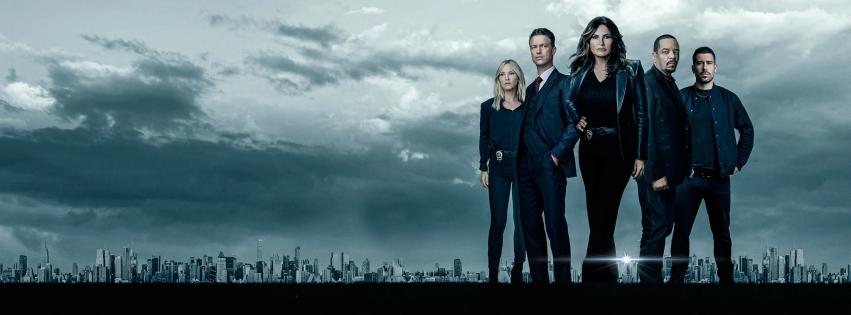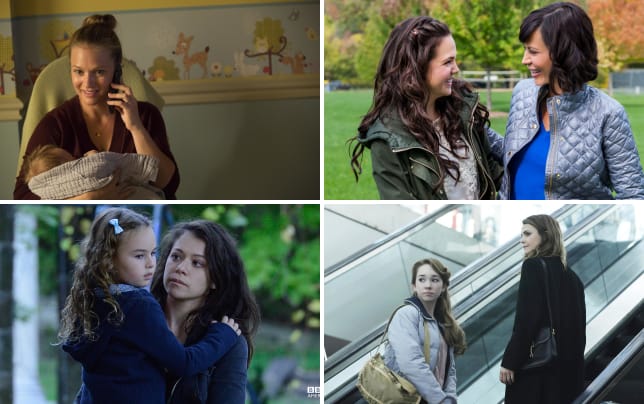Law & Order: SVU Season Finale Review: How Far Will Barba Go?
 Jack Ori
at
.
Updated at
.
Jack Ori
at
.
Updated at
.
Law & Order: SVU is known for its bigger-than-life season finales, and this one was no exception
On Law & Order: SVU Season 18 Episode 20, Barba's case against a suspect in the brutal rape and murder of a Muslim girl fell apart when his star witness was deported.
And on Law & Order: SVU Season 18 Episode 21 he used those same immigration laws to coerce a reluctant witness to testify against her husband.
If that wasn't bad enough, when the victim's mother lied on the stand about having provided evidence to Benson that she never did, Barba pressured her to lie on the stand!
Were there no lengths that he was unwilling to go to to get justice for the family of a dead girl?
The story was about the hot-button issue of immigration and immigration raids in sanctuary cities, but Barba's behavior can't really just be pushed to the side.
Opponents of immigration enforcement often argue that these laws are unjust and that many people are denied their Constitutional rights because of the color of their skin as a result of the way these laws are enforced.
But Barba, and for a little while Benson, were willing to do just that to get justice for the Muslim family that had been so brutally violated by anti-Muslim extremists.
Barba: What about the wife. She's illegal, right? Let's call ICE.
Carisi: Excuse me? We're gonna help ICE now to deport a woman with two little kids?
Barba: I dunno, but we're damn sure gonna threaten it.
Carisi: I thought New York was a sanctuary city!
Barba: Don't give me that. This is someone who stood there and did nothing while his friends raped and killed two people. I'm sorry, but my sympathy is with Lela and Mala Samra, not with Soledad Ramirez.
Benson: He's right. I'm not a showboat for the Feds and I don't give a damn about anyone's immigration status, but we have to do whatever we can in this case.
I had a lot of sympathy for Yousef Massad, and I thought that calling him a threat to national security that had to be immediately deported was really over the top. He had been stopped without any probable cause at all, just because ICE assumed undocumented people would be at a rally for immigrant rights that he wasn't actually part off.
ICE's attitude that a material witness warrant didn't matter because Yousef had refused to produce papers on demand while the police officer protecting him was trying to explain the situation was also ridiculous.
But while ICE's actions led to a potential miscarriage of justice, at least the officers involved were actually following the law!
Immigration laws are not meant to be used to coerce witnesses into testifying against their husbands, which is a violation of more than one of their Constitutional rights, and Rollins' continued threats to put the Ramirezes' children into foster care if they didn't cooperate were more than a little disturbing.
Rollins: Where is Hector?
Woman: I don't know.
Rollins: When was the last time you talked to him?
Woman: I don't know.
Rollins: We think he's involved in something very serious. Now you can either tell us here or we can take you down to the station and you can tell us there.
Woman: The station? I can't leave my kids.
Rollins: Oh, don't you worry about that. We'll call social services and they'll take good care of them.
Woman: Social services?
Rollins: I'm just telling you like it is. Now where is Hector?
Woman: He's working at a restaurant on 125th.
Coerced testimony is inadmissible testimony, period, no matter how good the cops' intentions are.
I also found it interesting that the brown-skinned, undocumented woman was far more scared of this threat than the white-skinned woman, which just reinforces the idea that these laws end up being just another form of racism more than anything else.
And how come the immigration lawyer was quick to jump to Hector Ramirez's defense, but no one showed up to protect Yousef Massad? He was the one whose immigration status was actually problematic, not Hector, even if Hector's wife was not here legally.
Yusef: They think we're all terrorists, like we're all the same.
Carisi: Most of us know better.
Yusef: I don't think so. All these protests, they're not gonna change anything. The world doesn't change. People don't change.
Carisi: I don't believe that. This is America, this is the American way. Isn't that why you came there?
Yusef: I came here because I like to be alive.
I thought Yousef's discussion with Carisi about protests right before ICE arrested him was one of the most interesting exchanges in the entire two hours. It really showed how presumptuous it is to assume that everyone comes to America because they believe it's the freest and best country in the world.
Yousef was here because he knew he would be killed at home for being gay, but he didn't really believe that America was as free or as admirable a country as Carisi did.
You don't give a damn about my son, cause he's not an immigrant or a queer or a trans whatever it's called. He's just a regular white kid, and for some reason that makes it so he doesn't matter to anybody.
Mrs. Jenkins
I had mixed feelings about the way the Jenkins were presented. I thought Mitch Jenkins was a walking stereotype of a white supremacist. He had some cliched lines about Muslims and Hispanics and believed that the current President's bigoted statements about Mexicans while on the campaign trail were absolute truth.
White supremacists are always portrayed like this, and that's unfortunate.
While certainly, nobody wants to glamorize these types of people, making them so stereotypical and cliched dilutes the point.
It allows those who disagree with them to dismiss them as idiots who don't understand American values while those who hold any type of racist belief can easily distance themselves because they don't think or act like these people.
It would have been better to have a more nuanced character rather than a tired trope. However, Mrs. Jenkins was a little bit more three-dimensional.
Mrs. Jenkins' words might have sounded bizarre to many viewers, but I thought they captured how some poorer white people feel — left out, left behind, uncared about by liberals while minorities get their support.
In her case, she'd called the police four times when her husband became violent and dropped the charges all four times. I wondered how the cops on duty responded to her calls.
Were they dismissive? Did they call her white trash or trailer trash? Did they have a "boys will be boys" attitude towards her husband's behavior?
It wouldn't surprise me if one or all of these things were true. If Mrs. Jenkins' cries for help went unheeded by police, it would make sense that she would feel like her life and that of her sons didn't really matter and that she was stuck with her husband.
Benson: It doesn't matter what I said or didn't say. Your husband is a rapist and a murderer.
Mrs. Jenkins: I know what they did.
Benson: Then do something about it.
Mrs. Jenkins: How can I? He is my husband.
Benson: I know that you called the police four times in the past year. Mitch is dangerous. You know that. And the next dead woman on the floor, that could be you. Don't tell the truth for Lela or for Maya. Do it for yourself and for your son.
I thought it was a little unrealistic that a woman who held these attitudes would immediately change her mind because she saw Benson not getting along with her Muslim witness.
In real life, someone like this might become suspicious that the argument was staged to make Benson look like she wasn't biased towards Muslims or feel that she got what she deserved for taking the side of "the enemy."
But this is television, so for dramatic effect, it's acceptable for someone to change their mind after one encounter.
Mrs. Jenkins seemed to understand that Benson actually did care about her, and Benson's words got through to her so that she could get on the stand and save the day.
In real life, an abusive husband might be able to intimidate his wife on the stand with a knowing look, but again, this is television, so Mr. Jenkins showed his true colors and was escorted out of court so that justice could finally be served — at least in this case.
As season finales go, this was a strong one, with a horrifying case that seemed to be totally unwinnable, a lot of people blaming Benson for their problems and an ethical dilemma on top of a struggle with another government agency.
There was no real cliffhanger, but I'm eager to see how Benson's relationship with Barba goes next season.
What did you think of the two-hour season finale? Was it dramatic enough or did it seem too preachy? Did you think the issues were presented fairly? What are you looking forward to when SVU returns in the fall?
Weigh in below, and don't forget that if you missed anything you can always watch Law & Order: SVU online to catch up.
Jack Ori is a senior staff writer for TV Fanatic. His debut young adult novel, Reinventing Hannah, is available on Amazon. Follow him on X.






